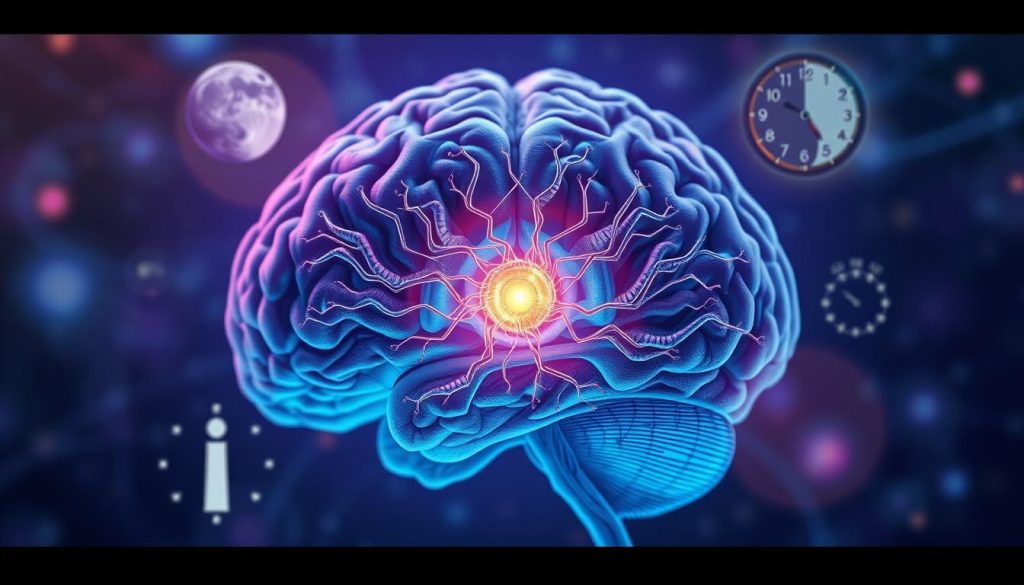We’re going to explore the world of circadian rhythms. These are our body’s internal clocks that control sleep, hormone levels, and health. We’ll learn what they are, why they matter, and how different things can affect them.
By the end, you’ll know more about your own circadian rhythm. You’ll also find ways to make it work better for you. This can lead to better sleep, health, and productivity.
Our bodies are closely connected to the Earth’s natural rhythms. Our circadian rhythms help us sleep, produce hormones, and manage other body functions. They follow the 24-hour day-night cycle.
Learning to work with your circadian rhythm can greatly improve your health and life. It can help you sleep better, be more productive, and feel better overall.
What is a Circadian Rhythm?
A circadian rhythm is a key part of our daily lives. It’s an internal body clock that controls many of our body’s functions. It works on a 24-hour cycle. But what is it, and how does it work?
The Body’s Internal Clock
Our circadian rhythm helps us sleep and wake up at the right times. It also controls hormone release and body temperature. It’s all managed by a part of our brain called the suprachiasmatic nucleus (SCN).
The SCN is like a master timekeeper. It makes sure our body’s functions work together smoothly.
Regulated by the Suprachiasmatic Nucleus
The SCN keeps our circadian rhythm in sync with day and night. It gets light information from our eyes. This helps our body’s clock stay on track.
This ensures we sleep, release hormones, and digest food at the right times.

Learning about our internal body clock and the suprachiasmatic nucleus is important. It helps us understand our sleep-wake cycle better. This knowledge can greatly improve our health and life quality.
The Importance of Your Circadian Rhythm
Keeping a healthy circadian rhythm is key for our well-being. Our internal clock, or circadian rhythm, controls many important functions. This includes sleep, energy, thinking skills, and how our immune system works.
When our circadian rhythm is in sync, we feel better and work better. But, when it’s off, we might struggle with sleep, metabolism, and even chronic diseases.
Our circadian rhythm affects how well we sleep. It tells our body when to sleep and when to be awake. Sticking to a regular sleep schedule helps us sleep better. This is important for our body and mind to heal, remember things, and stay healthy.
A healthy circadian rhythm also helps us think clearly, feel good, and have lots of energy. When our internal clock is working right, we focus better, make smarter choices, and get more done. But, if it’s off, we might feel tired, grumpy, and have trouble concentrating.
Our circadian rhythm also controls our metabolism and immune system. When it’s disrupted, we might gain weight, get diabetes, or face other health risks. Keeping our circadian rhythm healthy helps our metabolism and keeps our immune system strong.

In short, our circadian rhythm is very important. By taking care of our internal clock, we get many health benefits, work better, and live a better life. Making our circadian rhythm strong is a big step towards being our best selves.
Factors That Influence Your Circadian Rhythm
Our circadian rhythm is like an internal clock that tells us when to sleep and wake. It’s affected by many things. Taking care of these can help us stay healthy and feel better.
Light Exposure
Light is a big factor in our circadian rhythm. Our body’s clock follows the day and night. Morning sunlight helps set our rhythm right.
But, too much artificial light at night messes with it. This can make it hard to sleep.
Eating Habits
What we eat also affects our rhythm. Eating at odd times or late can confuse our body. Eating at regular times helps keep our rhythm in check.
Our lifestyle and daily routines also matter. Things like exercise, stress, and social life affect our internal clock. Being aware of these can help us keep our rhythm healthy.
Signs of a Disrupted Circadian Rhythm
When our body’s internal clock, the circadian rhythm, gets out of sync, we feel bad. We might have trouble sleeping and feel moody. These problems can really affect how we feel and live our lives.
Sleep Disturbances
One big sign is trouble falling or staying asleep. This can make us tired, grumpy, and hard to focus. We might wake up a lot or wake up too early.
Mood Changes
Our mood can also change when our internal clock is off. We might feel more anxious, sad, or have mood swings. These feelings can make it harder to sleep, creating a cycle of problems.
Spotting these signs is the first step to feeling better. By fixing these issues, we can get our circadian rhythm back in balance. This leads to better sleep and a happier, more stable life.

Strategies to Maintain a Healthy Circadian Rhythm
To keep our circadian rhythm healthy, we can try a few things. First, it’s key to have a regular sleep schedule. This means going to bed and waking up at the same time every day. Even on weekends, sticking to this schedule helps our body’s clock stay in sync.
Also, getting natural light during the day is important. Try to avoid blue light in the evening. This helps our body know when it’s time to sleep and when it’s time to be awake.
Regular exercise is another big help. Activities like walking fast or doing yoga can improve sleep. Eating well is also important. Avoid big meals before bed and eat a balanced diet. These habits help our circadian rhythm stay healthy.
By adding these habits to our daily routine, we can improve our sleep and health. Small changes can make a big difference. They help us feel better and be more productive.

